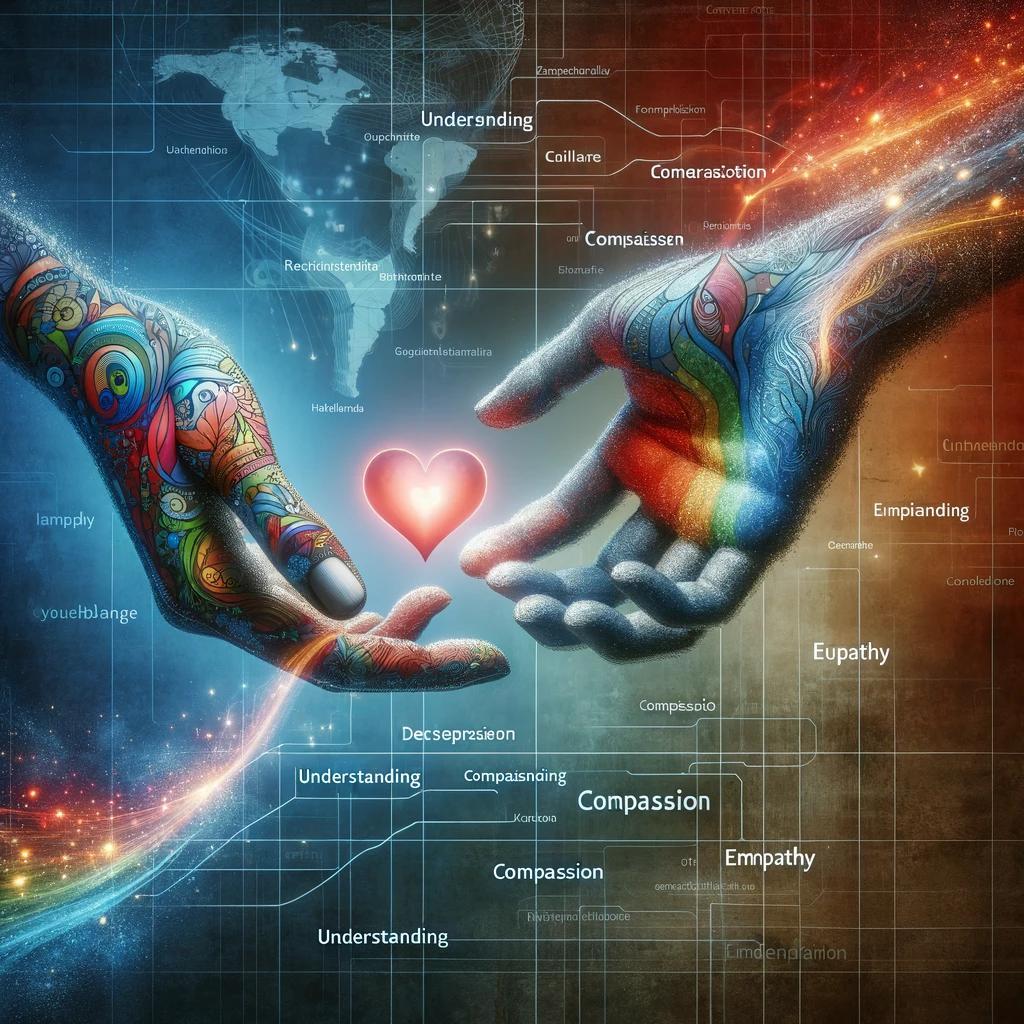
Saturday, February 10, 2024
The great gift of human beings is that we have the power of empathy.
Empathy: The Key to Compassion and Understanding in Our Lives
The human experience is an intricate tapestry. Threads of emotions, thoughts, and perceptions are all intertwined but empathy stands out as a luminescent strand, casting a warm glow on the connections between us. It is more than a mere psychological term; it is a profound ability to understand and share the feelings of others, an essential component of human connection that transcends material possessions and superficial interactions. Empathy, in its essence, is about emotional understanding and sharing, a bridge that spans the chasms of individual experiences, fostering compassion, and deepening our understanding of the human condition.
Empathy is not just a feeling; it is a skill, a practice, and a journey towards understanding others at a level that goes beyond words. It involves putting ourselves in someone else's shoes, seeing the world through their eyes, and feeling what they feel. This emotional resonance is what makes empathy a powerful tool for healing, connection, and transformation.

The Importance of Empathy in Modern Society
In a world that often prioritizes achievement, success, and material wealth, the importance of empathy might seem to take a backseat. However, the reality is quite the opposite. In the complexity of modern society, where isolation, division, and misunderstanding seem to be on the rise, empathy emerges as a beacon of hope, a force that can bring us closer, bridge divides, and foster a more compassionate world.
Empathy has the power to transform interpersonal relationships, whether they are personal, professional, or casual encounters. It allows us to approach conflicts with a mindset of understanding rather than judgment, leading to resolutions that consider the well-being of all involved. In the workplace, empathy can create environments where collaboration and creativity flourish, as individuals feel understood, valued, and motivated to contribute their best.
Beyond the immediate benefits to relationships and environments, empathy has far-reaching implications for society at large. It is the foundation upon which we can build more inclusive, just, and compassionate communities. By understanding the experiences and challenges of others, especially those whose voices are often marginalized, we can advocate for policies and practices that address inequality and injustice.
Cultivating Empathy in Our Daily Lives
Cultivating empathy is not always easy. It requires intention, practice, and a willingness to venture into the emotional landscapes of others, landscapes that may be unfamiliar or uncomfortable. However, the journey towards becoming more empathetic can start with simple, everyday actions:
- Active Listening: Truly listening to others, without judgment or the intent to reply, is the first step towards understanding their perspective. It involves giving your full attention, acknowledging their feelings, and responding with compassion. By practicing active listening, we signal to others that their thoughts and emotions are valid and important, fostering an environment of trust and openness.
- Vulnerability: Sharing our own emotions and experiences can foster empathy, as it invites others to connect with us on a deeper level. Vulnerability breeds empathy, creating a reciprocal exchange of understanding and compassion. This act of openness can dismantle barriers of pretense or misunderstanding, paving the way for more genuine relationships and deeper connections.
- Curiosity: Approaching others with genuine curiosity, asking questions, and showing interest in their stories can deepen our understanding of their experiences and perspectives. This mindset not only enriches our knowledge and appreciation of the diversity of human experience but also communicates respect and validation to the person sharing their story.
- Empathy Exercises: Practicing empathy can be as simple as imagining yourself in someone else's situation or engaging in role-reversal exercises where you consider how you would feel if you were in their position. These exercises can significantly enhance our emotional intelligence, helping us to develop a more intuitive understanding of others' emotional states and viewpoints.
- Seeking Diverse Perspectives: Exposing ourselves to stories, cultures, and experiences different from our own can broaden our understanding and empathy. This can involve reading books, watching films, or engaging in conversations that challenge our viewpoints and expand our horizons. By deliberately stepping out of our comfort zones and embracing diversity, we can cultivate a more inclusive worldview and strengthen our capacity for empathy.
The Challenges and Limits of Empathy
While empathy is a powerful tool for fostering connection and understanding, it is not without its challenges and limits. One of the main challenges is emotional burnout, which can occur when we take on too much of others' emotional burdens. It's essential to practice self-care and set boundaries to protect our well-being while being empathetic.
Moreover, empathy alone is not a panacea for all social ills. It must be coupled with action—steps taken to address the needs and challenges of those we empathize with. Empathy should be the spark that motivates us to make positive changes in our lives and the world around us.
Finally
Empathy is a bridge that connects us, allowing us to understand and share the feelings of others. It is a vital component of personal growth, relationship building, and the creation of compassionate communities. By cultivating empathy in our daily lives, we can contribute to a world where understanding and compassion prevail over division and indifference.
As we navigate the complexities of human relationships and societal challenges, let us remember the power of empathy to transform our interactions and the world. It is through understanding and sharing the feelings of others that we can truly connect, heal, and grow together. Empathy, in its purest form, is the essence of our shared humanity, a reminder that beneath our diverse experiences lies a common thread of emotions, hopes, and dreams. Let us hold onto empathy as a guiding light, leading us towards a more compassionate, understanding, and united world.

